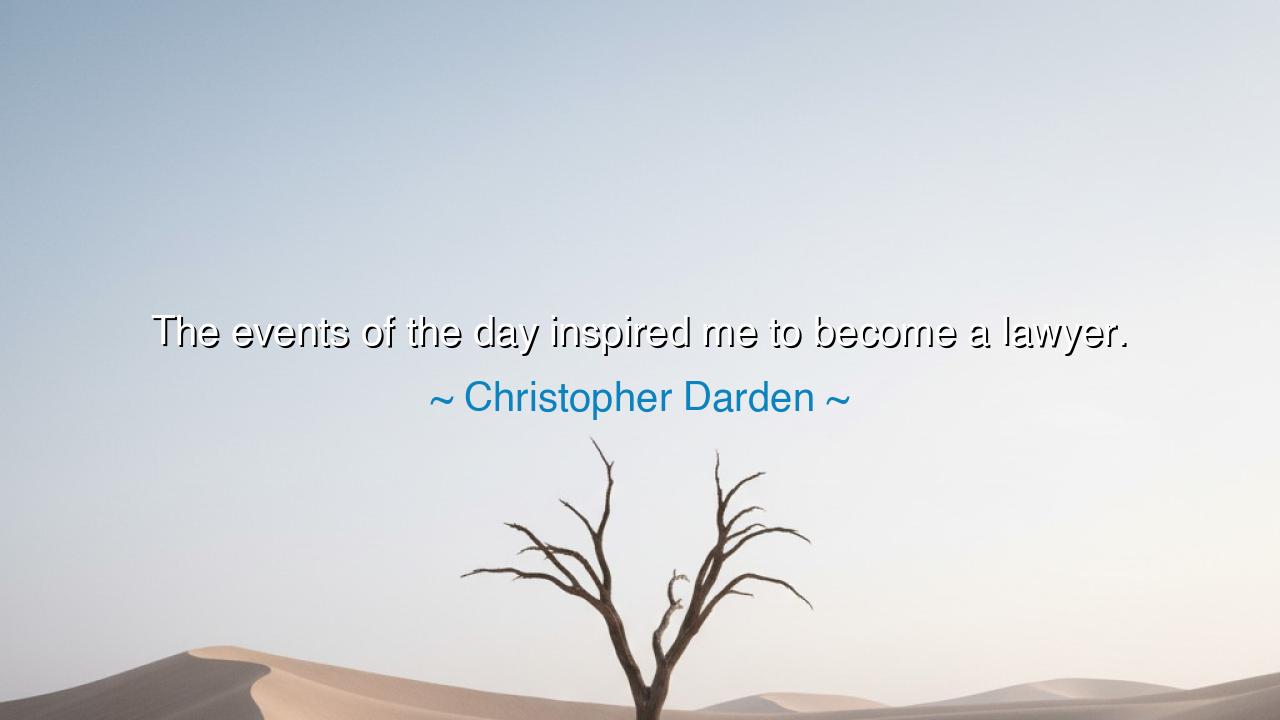
The events of the day inspired me to become a lawyer.






Hear, O listener, the words of Christopher Darden, who said with solemnity: “The events of the day inspired me to become a lawyer.” In this brief confession lies a story as old as humanity itself: that in moments of trial, when injustice casts its shadow over the land, there are those whose hearts ignite with a calling. They do not seek glory, nor wealth, but the chance to stand as guardians of justice, shaped not by comfort but by the storms of their time.
The meaning of his words lies in the recognition that destiny is often awakened by circumstance. A man does not always choose his path in quiet reflection; often it is the events of the day—the turmoil of society, the pain of his people, the sight of wrongs unchallenged—that carve the way forward. For Darden, who would one day stand in the eye of the storm during the O.J. Simpson trial, it was the injustices and struggles he witnessed in his youth that pressed upon his soul and forged his decision: to become a lawyer, to wield the law as a sword for the oppressed.
The ancients knew this truth. It was not ease that made heroes, but crisis. Moses, witnessing the suffering of his people in Egypt, was moved to lead them toward freedom. Pericles, shaped by the tumult of Athens, rose to defend democracy. And so too did Darden, in his own era, find that the daily struggles of inequality and prejudice were not just passing news, but a summons upon his life. The events of the day were not only happenings in the world around him—they became the forge that shaped his soul’s vocation.
Consider also the story of Thurgood Marshall, the great American jurist. As a young man, he witnessed racial segregation enshrined in law. The daily humiliations of discrimination were the “events of the day” that stirred him to take up the path of law. Through perseverance, he became the lawyer who argued Brown v. Board of Education, striking down the false doctrine of “separate but equal.” Like Darden, Marshall’s destiny was not born in silence, but in the cries of his time.
There is a heroic lesson here: when we encounter the sorrows and injustices of our age, we are not merely spectators. We are called to respond. Some turn away, numbing themselves to the pain of others. But others, like Darden, allow themselves to be moved, to let the fire of circumstance enter their spirit until it burns as purpose. To become a lawyer, in this sense, is not merely to practice a profession, but to take upon oneself the heavy mantle of justice, to defend the weak, to confront corruption, and to ensure that the law, however flawed, may yet be bent toward righteousness.
Yet we must not limit this lesson to the law alone. Each of us, whatever our calling, will face the events of the day—moments when the world tests our resolve. We may not all become lawyers, but we may all become defenders: of truth, of kindness, of fairness, of hope. The key is not to remain unmoved, but to see in the struggles of our time the spark of our own purpose.
Therefore, O listener, remember Darden’s words and let them guide you. Look to the events of your day—whether injustice in your community, suffering among your neighbors, or corruption in the halls of power—and ask not, “Why is this happening?” but rather, “What will I do because of this?” For greatness is not born in isolation, but in response to the cries of the world. Let your life, too, be shaped by the times, and may you rise as one who answers the call of justice with courage.






AAdministratorAdministrator
Welcome, honored guests. Please leave a comment, we will respond soon